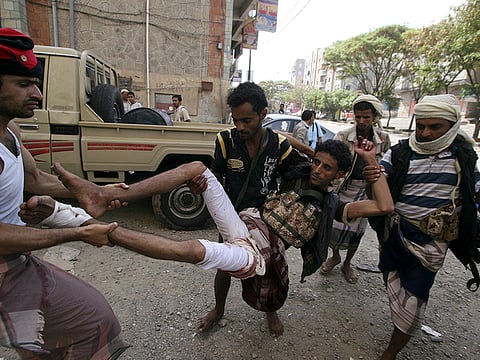Al Houthis push into Yemen’s third-largest city despite truce
Al Houthis reportedly agree to talks in Geneva if coalition air strikes end

Sana’a: Iran-backed Al Houthi militiamen on Friday attempted to expand their presence in the central Yemeni city of Taiz despite a humanitarian truce, local journalists said.
Taiz, the country’s third-largest city after Sana’a and Aden in the south, is strategically located on the road leading to Aden, which the rebels have been trying to seize since March.
Al Houthis have agreed with the visiting UN envoy to resume UN-brokered talks as long as the Saudi-led air campaign is halted, government officials have said.
According to an information ministry official, representatives of the group and former president Ali Abdullah Saleh said they were ready to resume the UN-brokered talks after the alliance suspended air strikes, adding that they believed Geneva, instead of Riyadh, should be picked to host the talks, Xinhua news agency reported on Thursday.
The UN special envoy for Yemen, Esmail Ould Shaikh Ahmad, left Sana’a on Thursday after his first visit to Yemen since he was appointed two weeks ago.
During his two-day visit to Sana’a, the envoy met with leaders of the General People’s Congress (GPC) party headed by Saleh, and representatives of Al Houthis, according to reports of the country’s official Saba news agency, now under the control of Al Houthi group.
The report said Shaikh Ahmad discussed with the GPC and Al Houthis the possibility of prolonging the five-day humanitarian truce, and ways to resume the dialogue between the Yemeni parties, as well as means to facilitate humanitarian relief operations.
The GPC officials and Al Houthi representatives asked for UN intervention to halt the Saudi-led airstrikes as a condition for resuming the talks, Saba reported.
Fierce clashes erupted between local militiamen in Taiz and the militiamen after Al Houthis and their allied military units tried to seize the areas of Hud Al Ashraf and Al Shemasi from loyalists of embattled President Abd Rabbo Mansour Hadi.
At least 10 rebels were killed, the journalists told dpa without reporting casualties among the local fighters.
The ongoing fighting has prompted locals to flee to safer areas in Taiz.
Warplanes from an anti-rebel coalition led by Saudi Arabia were patrolling Taiz, but were not carrying out air strikes, according to witnesses.
A five-day truce that went into effect in Yemen late Tuesday was intended to allow the delivery of humanitarian aid to civilians.
The Saudi-led coalition Thursday warned the truce “would not last long” in the face of breaches.
The coalition “warns the Al Houthi militias and their supporters that self-restraint and being committed to the truce would not last long in [the] case the militias continue such practices,” it said.
The United Nations humanitarian coordinator for Yemen meanwhile urged the coalition to ease its inspections of Yemen-bound cargo to speed up imports of vital goods which are still being held up despite a humanitarian truce.
As electricity is lacking across Yemen, fuel is critical to run generators in hospitals, pumps for the water and sanitation system, and the communications grid, Johannes van der Klaauw told a UN briefing in Geneva via audio link from Sana’a.
The tightly enforced inspection regime has hindered delivery of urgent humanitarian supplies to Yemen, while roadblocks and continued sporadic fighting were still holding up distribution within the country, Van de Klaauw said.
“The arms embargo and its inspection regime results in commercial goods, be it by air or ship, no longer reaching the country,” he said. Inspections should be speeded up so that imports of commercial and humanitarian goods, including fuel, “food and other life-sustaining necessities can resume”.
In the south of the country, tribesmen allied with Al Qaida’s branch in Yemen have imposed a ban on the nation’s widely popular plant called qat, which is a mild narcotic, in a southern city overrun by the militants last month.
Leaflets from the tribesmen organised as “Sons of Hadramawt” have been distributed across Mukalla, the capital of Yemen’s largest province, Hadramawt, which was seized by Al Qaida in April.
The flyers say qat chewing is banned as of Thursday and that violators will face a “religious responsibility,” without elaborating.
Sign up for the Daily Briefing
Get the latest news and updates straight to your inbox


